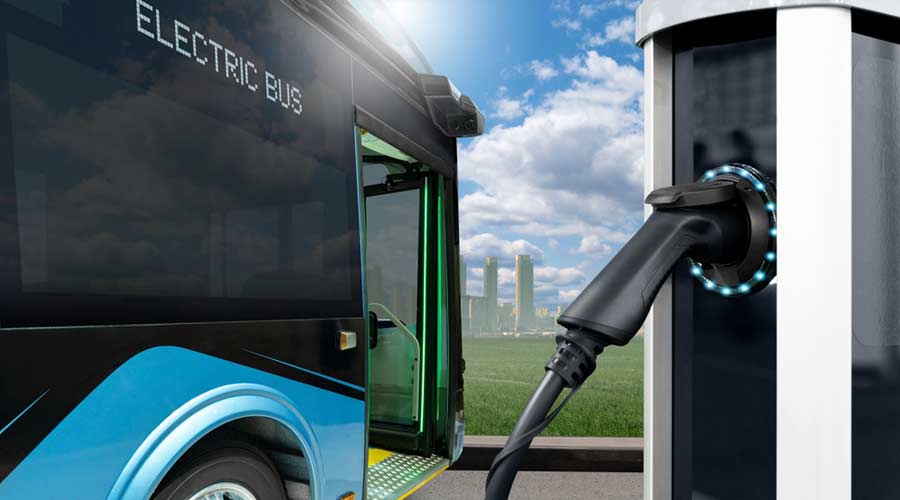Weighing the Value of EV Charging Stations
As the use of electric vehicles grows, facility managers must consider the expense as a perk for building occupants.
By Andrew Birch and Robert Gray, Contributing Writers
With $5 billion coming from the new Bipartisan Infrastructure Law aimed at accelerating the production of electric vehicles (EVs) and clean cars, the race is on to develop the necessary infrastructure.
Commercial building owners will be tasked with conceiving a plan and investing in the installation and maintenance of reliable and fast public charging stations to serve their customers and tenants.
Currently, less than 5 percent of Americans drive EVs. However, recent surveys point to an imminent shift to green cars, and quickly. According to Energy.gov, sales of all-electric vehicles and plug-in hybrid electric vehicles nearly doubled in 2021. Forty percent of Americans are planning to drive an electric car in the next five years, a jump of 32 percent from February and 30 percent from 2021. From pickup trucks to compact vehicles, car manufacturers from Ford to Subaru are adding new models to their lineup at an attractive price point that may cause fierce competition in the car industry, further driving down the cost of EVs.
EVs need to be recharged approximately every 250-350 miles, so the availability of charging stations at retail centers and office complexes provides a major convenience to its customers or tenants. Such amenities are quickly evolving from luxuries to necessities.
The psychology is simple. Consumers will visit, shop, or eat at stores where they can charge their cars for free. Offices can charge higher rents to attract companies which, in turn, will promote the charging stations to attract top talent.
To offset these costs, managers may opt to charge tenants based on the amount of energy that is being transferred to their car battery. They can also determine whether to charge by the minute or set a monthly charging fee. While occupants like inclusive amenities, they also value convenience, so building owners and landlords can evaluate whether offering free or discounted EV charging is a worthy investment to attracting prospective tenants. Another option is to monetize the service and offset some of the development costs.
With the return of public gatherings, commercial buildings such as movie theaters, concert venues, shopping malls, healthcare centers, office buildings, and colleges can leverage forward-thinking and environmentally friendly services to appeal to customers, employees, and students. People’s daily errands and activities in most suburban areas revolve around big box retailers. The implementation of stations at these sites will contribute to customer satisfaction and retention, likely resulting in longer and more frequent visits to these establishments. Busy Americans are constantly looking for solutions to make their lives easier and reduce time spent on running errands. If a commercial real estate landlord doesn’t offer EV charging stations, they run the risk of losing business to their competition.
While many people are still working from home, companies hoping to lure their employees back to cubicle life need to place a high emphasis on what they can offer in terms of work/life balance.
As with all new innovations, there are risks and less desirable factors to consider. Commercial real estate owners will not see an immediate return on investment in offering charging stations until the infrastructure has been constructed. In time, large retailers may be able to aggregate data to measure how these stations are affecting their bottom line. This is an investment that will not be immediately useful to many Americans today, but will pay off in the near future.
Retailers and building owners need to consider the cost of upgrading power panels to accommodate the higher-level circuits that are required to operate charging stations without causing power outages. This addition can run $60,000 or more. Installing a single charger costs approximately $6,000 for Level 2 AC chargers and $20,000 for DC fast chargers. Beyond initial purchasing and construction, electric bills can be expected to rise as well.
All of these economic calculations will need to be made carefully, but the time to do so is running out. EV charging stations are poised to be the next "free Wi-Fi" in terms of tenant amenities, and soon the cost of not investing in EV charging stations could be much more damaging. Commercial building and property owners need to assess their demographic, risk, and both the impact and cost of having — or not having — charging stations at their place of business.
Andrew Birch and Robert Gray own and run GrayBirch Construction in Lake Elsinore, California. The founders have more than 45 years of combined experience in project and operations management in wireless communication systems, hydrogen fueling stations, electric vehicle (EV) charging stations, and retail construction.
Related Topics:












